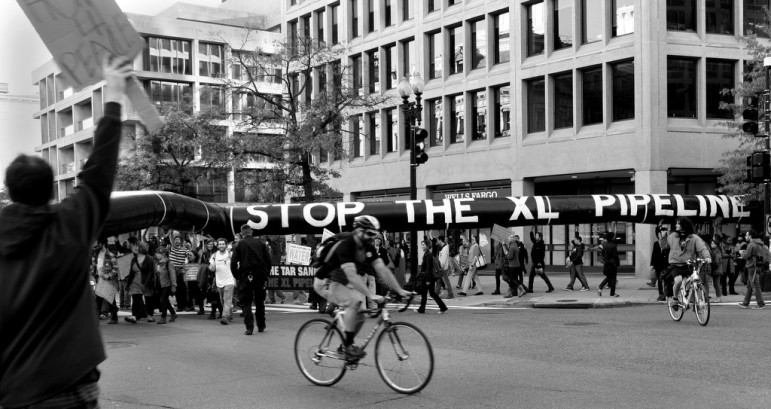
November 7, 2015; New York Times
On Friday, President Obama announced that because of concerns regarding climate change, he was rejecting a request from the TransCanada Corporation to build the Keystone XL Pipeline. This does not mean, of course, that the issue won’t get resurfaced in another administration; some believe the president was just waiting out the situation. But for now, advocates can pat themselves on the back for keeping the heat on the issue.
“America is now a global leader when it comes to taking serious action to fight climate change,” Mr. Obama said in his statement. “And, frankly, approving this project would have undercut that global leadership.”
President Obama also said the pipeline’s role as a political football has given it disproportionate importance. “It has become a symbol too often used as a campaign cudgel by both parties rather than a serious policy matter. And all of this obscured the fact that this pipeline would neither be a silver bullet for the economy, as was promised by some, nor the express lane to climate disaster proclaimed by others.”
Some see the timing of the decision as related to the election of Justin Trudeau as Prime Minister of Canada, which Rick Cohen covered in this newswire. Although Trudeau supported the pipeline, he did not believe it to be as central to the relationship between Canada and the United States as his predecessor.
Sign up for our free newsletters
Subscribe to NPQ's newsletters to have our top stories delivered directly to your inbox.
By signing up, you agree to our privacy policy and terms of use, and to receive messages from NPQ and our partners.
There is no doubt that environmental activists on both sides of the border played a key role in the decision. There have been many reports of administrative and law enforcement harassment of environmental groups in Canada. In the U.S., Bill McKibben of 350.org was an early opponent of the pipeline, and he says that the decision gives Obama “new stature as an environmental leader, and it eloquently confirms the five years and millions of hours of work that people of every kind put into this fight.”
The New York Times writes that “both supporters and critics of Mr. Obama saw the surprisingly powerful influence of environmental activists in the decision” and that “environmental activists cheered the decision as a vindication of their influence.”
“Once the grass-roots movement on the Keystone pipeline mobilized, it changed what it meant to the president,” said Douglas G. Brinkley, a historian at Rice University who writes about presidential environmental legacies. “It went from a routine infrastructure project to the symbol of an era.”
—Ruth McCambridge











